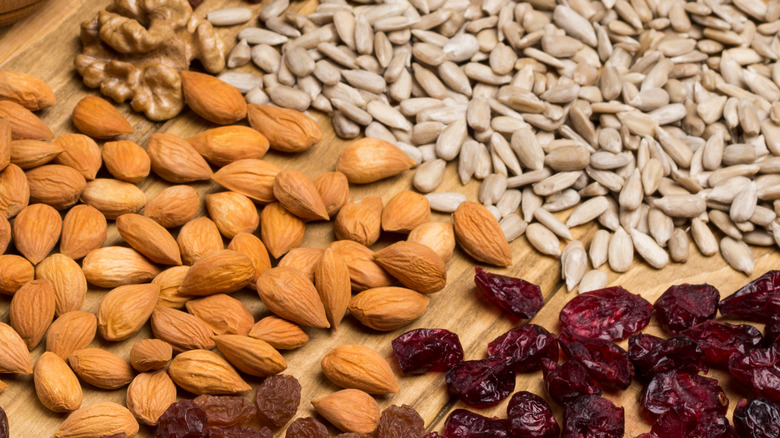Vitamins That Are Also Antioxidants
Antioxidants are critical for your health because they help prevent cell damage caused by unstable compounds called free radicals. Some free radicals are formed in your body, but others come from the environment and include air pollution, sun damage, and cigarette smoke. The damage they cause is referred to as oxidative stress, and it is associated with many conditions including heart disease, cancer, diabetes, Alzheimer's, and some eye diseases (via National Center for Complementary and Integrative Health).
Vitamin C is a popular antioxidant, and your body needs it for cartilage and collagen production. This nutrient also helps your body heal while protecting it against damage caused by free radicals. Your body cannot make vitamin C on its own, so it's important to make sure you get enough of it in your diet (via Mayo Clinic). You can find this vitamin in citrus fruits like oranges, lemons, and limes. Other sources include potatoes, strawberries, broccoli, kiwis, spinach, and tomatoes, per Live Science.
Vitamin E
Vitamin E is a fat-soluble antioxidant which means if you are taking it as a supplement, you need to do so with foods that contain fat for better absorption (via Healthline). The benefits of vitamin E include enhancing your immune system as well as helping cells communicate with each other, which helps them to function, according to the National Institutes of Health (NIH). Vitamin E may even assist in keeping your eyes healthy as well as reducing your risk of a heart attack. Research also suggests that it might prevent cognitive decline, per WebMD.
Adults need about 15 milligrams of vitamin E per day. You can find it in wheat germ oil, almonds, avocados, peanut butter, sunflower seeds, pine nuts, fish, and red bell peppers. In addition, many foods, including cereals and juices, are fortified with it. If you eat a balanced diet, you probably get enough vitamin E, and shouldn't need to take a supplement (via WebMD).
Beta-carotene and vitamin A
Beta-carotene is an antioxidant that gives orange and yellow foods their color. Beta-carotene is a carotenoid, and like vitamin E, you need to take it with a fat source so your body can absorb it more efficiently. Your body converts some carotenoids to vitamin A (via Live Science). Along with giving your immune system a boost, vitamin A contributes to eye health and is important for your skin as well, according to Mount Sinai.
Men should aim for 3,000 international units (IU) of vitamin A and women need about 2,333 IU per day. Sources of this nutrient include leafy greens, tomatoes, red bell peppers, carrots, cantaloupe, eggs, milk, and fish oils (via Harvard Health). You should be careful when taking vitamin A supplements because too much can be toxic — especially if you smoke. Certain weight loss and cholesterol-lowering medications may decrease levels of beta-carotene in the body, so be sure and mention any concerns you have with your healthcare provider, per Mount Sinai.



